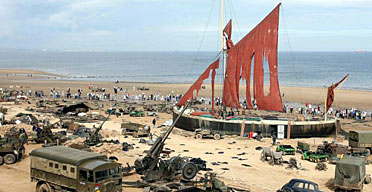Personally, when considering the monumental task which faced Joe Wright, the director, and Christopher Hampton, the screenwriter; I believe that the film is very well done, and quite accurately depicts the events of the novel. Special attention should be drawn to Part One, as I believe most readers would agree that it was particularly accurate in its adaptation from the novel. It is clear that a great deal of time and effort has been put into all aspects of this production to ensure historical accuracy as much as possible. Factors such as the acting, setting, and cinematography in Part One all contribute greatly to the historical accuracy.
Wright and Hampton choose to bear all in a sense when in comes to the depiction of war in the film. We see not only the terrors of war, but also the gruesome outcomes.This film contains some powerful images of a grim and brutal reality, of bloody wounds and shattered limbs, and of a frantic and helpless time. The scenes on the beaches of Dunkirk were particularly well shot and also contribute to a successful historical adaptation in my eyes.
 |
| Beaches of Dunkirk |
However, There are individuals who believe that the later part of the film is riddled with inaccuracies. A user on IMDB claims that "from a historical perspective, Atonement, leaves a lot to be desired". He states in his article that he believes there are several obvious inaccuracies which exist. One example that is given, is the use of a 'Lancaster' model aircraft in 1931, when it shouldn't even have been built yet. Another is that Dunkirk actually occurred in 1940, not 1941, as displayed in the film. His further examples do draw into question the accuracy of the scene at Dunkirk, but I still believe that for the most part, the message which McEwan is attempting to send, rings true.
Stay Connected:

No comments:
Post a Comment